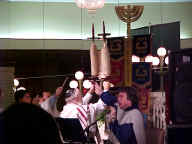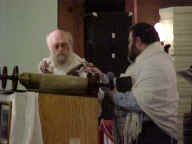Why Another English Translation?
First and foremost, because most translations use foreign names for the
Creator--names that, during the age of grace may have been adequate to
communicate the idea of "the highest deity", but which still borrowed the names of deities known in various culturolinguistic contexts that did not presuppose an accurate worldview, and thus brought with them baggage that we have had to, at best, "un-learn".
As renters know well, the days of grace do not last forever. As knowledge increases, so does our responsibility to jettison every bit of paganism that is brought to light. Not only did YHWH specifically forbid His people to even have the names of foreign deities on our lips (Exodus 23:13), but specifically commanded us to use His revealed name (Deuteronomy 6:13; 10:21).
He also forbade us specifically from setting a table to Gad (Isaiah 65:11), which is pronounced exactly like the name of the Germanic deity (God) whose name is most often substituted for YHWH's; even if there is no linguistic connection (which is not yet proven). Though one of the tribes of Israel has the same name, in the context of worship we must be much more cautious. The term "Lord", while it later came to have other meanings, also stems from a similar pagan ruler's name --and one associated with swine-farmers, no less!
English translations normally do not make a clear distinction between "YHWH" and "Elohim" (a term with much broader applicability). This has led to much theological confusion. Things are often clearer in Hebrew, so this version uses the original Hebrew names. "Yahweh" (or perhaps "Yahuweh") is the pronunciation, but to remind the reader to speak it only with the utmost
reverence, the four-letter equivalent of the unpointed Hebrew word (YHWH) is used here.
Most English spellings of Biblical names are based on German transliterations, which are generally fairly close to the Hebrew. But due to
linguistic shifts, they are no longer pronounced the same in English, and thus the spellings we usually have carried us further from the names to which these people would answer. Therefore, proper names are transliterated phonetically, with the common English equivalent sometimes added for clarity.
In some cases church-oriented translations have cloaked ordinary, everyday Hebrew words with an almost "magical" meaning and need to be demystified.
On the other hand, as in English, a Hebrew word may have many meanings. As an analogy, in English, the word "right" most often means "correct", but it
also often means a particular side of the body, and can even mean "90 degrees". Being so far removed from the original context (and often too
proud to ask those who spoke Hebrew), many translators often opted for the most common meaning of a word if the exact sense was not known, and thus, while perhaps not giving false information, the "bugle" has been given an indistinct sound, and "no one prepares for battle". Thus, even a translation made a year ago is already out of date in this sense, and there is always room for revision. Now, many prophecies were "sealed up" until the time they were needed. But now that Hebrew has become an everyday language again,
linguistic science has turned up more insights into rhetorical styles, and archaeological knowledge has mushroomed, we have many more resources at our
disposal to decipher just what the Biblical writers were referring to.
The "Lost Sheep of the House of Israel"--the Northern Kingdom that YHWH promised to bring back into covenant as an entire people in the latter
days--are only now rediscovering their roots. This has come to light so recently that, to our knowledge, no other translation has noted that this
prophecy has now begun to be fulfilled, yet there are so many passages in the Torah that can only be understood in light of this marvelous truth. One of the main purposes of this translation is to highlight the "road signs" that point us back to the "ancient path" that we are discovering to be our own heritage as well as Judah's.
"To the Torah and to the testimony! If they do not speak in agreement with this word, they have no light..." (Yeshayahu/Isaiah 8:20) If an
interpretation of any part of Scripture contradicts this "constitution" of the whole House of Israel, then it is mistaken, or at best the emphasis is
misplaced. What is often called the "New Testament" is actually a renewal of this one, with only slight modifications in light of Messiah's first coming and a few allowances made during our exile from the Promised Land. To miss this continuity leads to heartbreaking misperceptions. A correct understanding of Israel's founding document is absolutely essential.
Finally, I have attempted to make the text as literal as possible, rearranging word order or inserting words in brackets only where necessary to smooth out the English readability. Except where the original language clearly implies a fuller rendering, I have reserved most explanations,
clarifications, and alternate readings for the notes that appear below the pertinent verses.
May YHWH bless you and add insight as you read this rendering of His Word.
Stephen Zimmerman,
Translator and compiler of commentary
|
|
More articles by Stephen Zimmerman
KEY TO SPELLINGS AND ABBREVIATIONS
IN THE BIBLE TRANSLATION:
In Order after each book name:
Book Title, Traditional English Name, Abbreviation(s) Used
(Titles which are named after particular people are spelled as close to the Hebrew pronunciation as possible, or the Greek, where the Hebrew was not available.)
Part I: The Tenach (Old Testament/First Covenant Tnch., F.C.)
The Torah (The Law of Moses) Tor.
Genesis (B'Reyshith, Beginnings) Genesis, Gen. 1
Exodus (Shemoth, The Words) Exodus, Ex.
Leviticus (WaYiqra, And He Said) Leviticus, Lev.
Numbers (BaMidbar, In the Wilderness) Numbers, Num.
Deuteronomy (Devarim, Rep. of the Covenant) Deuteronomy, Deut.
The Nevi'im (Prophets) Prophetic Books, Nev., Proph.
Yeshayahu (Isaiah) Yesh., Ysh., Yeshay.
Yirmyahu (Jeremiah) Yir., Yirm.
Lamentations of Yirmyahu (Eychah) Lamentations, Lam.
Book of the Prophet Yechezqel (Ezekiel) Ychzql., Ych.
Book of the Prophet Daniel, Dan.
Book of the Prophet Hoshea (Hosea) Hos., Hosh.
Book of the Prophet Yoel (Joel) Yo.
Book of the Prophet Amos, Am.
Book of the Prophet Ovadyah (Obadiah) Ov., Ovad.
Book of the Prophet Yonah (Jonah) Yon.
Book of the Prophet Micha (Micah) Mic.
Book of the Prophet Nachum (Nahum) Nach.
Book of the Prophet Havaqquq (Habakkuk) Hav.
Book of the Prophet Tsefanyah (Zephaniah) Tsef., Tsf.
Book of the Prophet Haggay (Haggai) Hg., Hag.
Book of the Prophet Zecharyah (Zechariah) Zech., Zch.
Book of the Prophet Malachi, Mal.
The Ketuvim (Writings) Historical/Poetical Books, Ket., Ktvm.
Yehoshua (Joshua) Yeh., Yehosh.
Judges (Shoftim), Jdg., Judg.
Ruth, Ru.
Books of the Prophet Shmu'el (I & II Samuel) I Shm., 2 Shm.
Books of the Kings (Melachim), I K., 1 K., 2 Kgs.
Chronicles of Israel/Yehudah (Dibri HaYamim), I & II Chronicles, I Chr., 2 Chron.
Book of the Prophet Ezra, Ez.
Book of Nechemyah (Nehemiah) Nech.
The Magillah of Hadassah (Esther), Had.
The Story of Iyov (Job) Iy.
The Psalms (Tehillim) Ps.
Proverbs of Solomon (Mashley Shlomo) Pr., Prov.
Qoheleth Ecclesiastes (The Preacher) Qoh.
Song of Songs (Shir HaShirim), Song of Solomon, Song/S., S/S
Part II: The Renewed Covenant (New Testament), R.C.
(B'rit Chadasha)
The Good News as Recounted by The Gospels G.N.
Mattithyahu (Matthew) Mat., Matt.
Markos (Mark) Mk., Mark.
Lukas (Luke) Lk., Luk.
Yochanan (John) Yoch.
Deeds of the Holy Spirit through the Envoys (Acts of the Apostles) Env.
Letters from the Envoys (Apostolic Epistles) Ltrs.
Letter from Rav Shaul (Paulos/Paul) to the Romans, Rom.
Letters from Shaul to the Korinthians (I & II Corinthians) I. Kor., 2 Kor.
Letter from Shaul to the Congregations in Galatia (Epistle of Paul to the Galatians) Gal.
Letter from Shaul to the Congreg. in Efesos (Epistle of Paul to the Ephesians) Ef., Efes.
Letter from Shaul to the Congreg. in Filippi (Epistle of Paul to the Philippians) Fil.
Letter from Shaul to the Congreg. in Kolossae (Epistle of Paul to the Colossians) Kol.
Letters from Shaul to the Cong. in Thessaloniki (I & II Thessalonians) I Thess., 1 Thes.
Letters from Shaul to Timotheos (I & II Timothy) I Tim., 2 Tim.
Letter from Shaul to Titos (Titus) Tt.
Letter from Shaul to Filemon (Philemon) Flmn.
Letter to the Hebrews (Messianic Jews) Heb.
Letter from Yaakov (James) Ykv.
Letters from (Shim'on) Kefa (I & II Peter) I Kf., 2 Kf.
Letters from Yochanan (I, II, & III John) I Yoch., 2 Yo., 3 Y.
Letter from Rav Yehudah (Jude) Yeh., Yhd. .
Prophecy:
Revelation of Yeshua the Messiah (Revelation to St. John the Divine) Rev.
Other Common Proper Names and their meanings:
Persons:
Andreas (Andrew)
Avimelech (Abimelech) = My father is a king
Aviyah (Abijah) = Yahweh is my Father
Avraham (Abraham) = Father of Many Nations
Avram (Abram) = Exalted Father
Bar-Abbas (Barabbas) = Son of Abbas
Binyamin (Benjamin) = Son of my right hand/son of many days
Cham (Ham)
Chananyah (Hananiah, Ananias)
Chanokh (Enoch) = Teaching
Chavvah (Eve) = Living
Dawid (David) -- from teh word for "beloved"
D'vorah (Deborah) = Bee
El'azar (Eleazar) = Elohim helped
Elisheva (Elizabeth) = My Elohim promised
Elohim -- Emphasizes that Yahweh is a judge (a plural word with singular grammatical usage)
Ever (Eber > Hebrew) = crossing over
Filippos (Philip) = Horse-lover
Gid'on (Gideon)
HaSikkaryoth (Iscariot) = Cut-throats
Hevel (Abel)
Hizqiyahu (Hezekiah) = Yahweh is my strength
Kayafa (Caiaphas)
Kefa (Cephas, Peter, Petros) = A stone
Lavan (Laban) = white one
Levi = My heart
Luqa (Luke, Lukas)
Manoach (Manoah) = Comfort, Strengthening
Mashiach (Messiah) = The Anointed One
Menashe (Manasseh) = Forgetting
Methushelach (Methuselah) = With his death, it [the deluge] will come
Miryam (Mary, Miriam)
Nachor (Nahor)
Noach (Noah) = Rest, Comfort
Pinchas (Phinehas, Phineas)
Qayin (Cain)
Rechav'am (Rehoboam)
Reuven (Reuben) = Look, a son!
Rivqah (Rebekah)
Sheth (Seth) = Appointed
Shim'on (Simon, Simeon) = Really, truly hearing
Shlomo (Solomon) = His peace
Stefanos (Stephen) = Crown
Terach (Terah)
Tsadoq (Zadok > Sadducees) = Righteous
Ts'daqyah (Zedekiah) = Yahweh is (my) righteousness
Ya'aqov (Jacob) = Heel-grabber, supplanter
Yafeth (Japheth)
Ya'ir (Jairus)
Yarav'am (Jeroboam)
Yared (Jared) = Shall come down
Yehoshafat (Jehoshaphat) = Yahweh is watching/looking
Yehudah (Judah, Judas > Jew) = Praise
Yisrael (Israel) = One who struggles with Elohim/Prince with Elohim
Y'shua, Yahshua (Jesus) = Yahweh is salvation
YHWH (Yahweh, Jehovah) = I will be what I will be
Yishai (Jesse)
Yishmael (Ishmael) = Elohim will hear
Yissaschar (Issachar) = There is recompense
Yitzhaq (Isaac) = Laughter
Yochanan (John) = Yahweh is gracious
Yoseyf (Joseph) = Yahweh will add
Yoshiyahu (Josiah) = Yahweh is my salvation
Zakkai (Zacchaeus)
Zavdi (Zebedee)
Zecharyah (Zechariah, Zacharias) = Yahweh remembered
Places:
Amarah (Gomorrha)
Bavel (Babel) = Gate of Elohim
Beyth Anyah (Bethany) = House of unripe figs
Beyth Fagey (Bethphage) = House of ripe figs
Beyth Lechem (Bethlehem) = House of bread (food)
Beyth Tsaydah (Bethsaida)
Eilat (Elath)
Ferath (Euphrates)
Galil (Galilee) = The circle
Giv'ah (Gibeah)
Giv'on (Gibeon)
Hatzor (Hazor) = The Rock
Kanaan (Canaan)
Karmel (Carmel)
Kaysria (Caesarea) = Caesar's place
K'far Nachum (Capernaum) = Village of Consolation
Moav (Moab) = From the father
Moryah (Moriah) = Myrrh of Yahweh
Natzereth (Nazareth) = Branch
S'dom (Sodom)
Shiloah (Siloam)
Shomron (Samaria)
Soreq (Sorek)
Tsarfath (Zarephath, Sarepta)
Tsi'on (Zion)
Tsiydon (Sidon)
Tsoraa (Zorah)
Yafo (Joppa, Jaffa) = Beautiful
Yarden (Jordan) = Runs downward from Dan
Yehudah (Judea) = land of the Jews
Yericho (Jericho)
Yerushalayim (Jerusalem) = Light and peace, or He sees (two kinds of) peace
Yizre'el (Jezreel) = Elohim will help
Tribes and National groups:
Chittites (Hittites)
Chiwites (Hivites)
Yevusites (Jebusites)
|

Visit Congregation Beth Lechem's NEW and IMPROVED all-in-one web site:
Click here |


